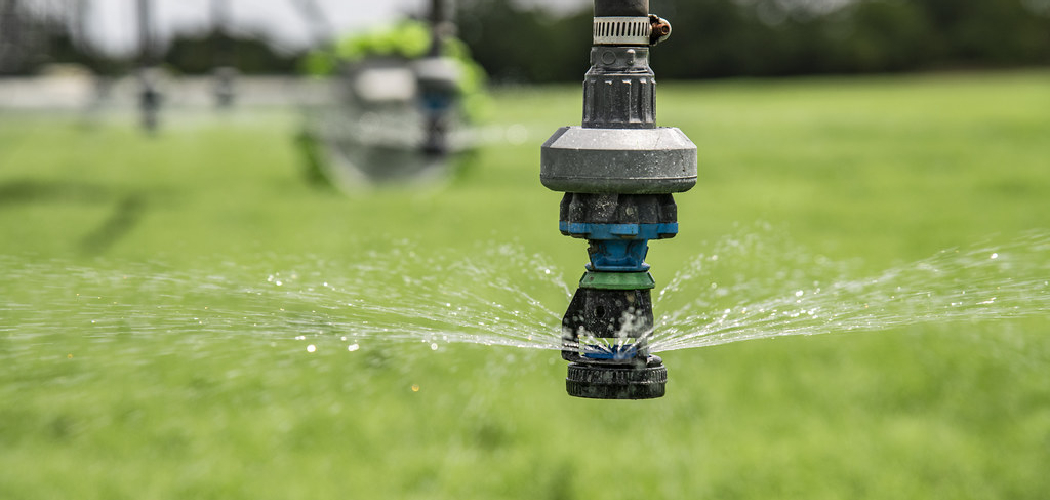Automatic irrigation systems are incredibly convenient but can also be a headache when malfunctioning or needing maintenance. It can be complicated to shut off your irrigation system if you’re unsure of what to do.
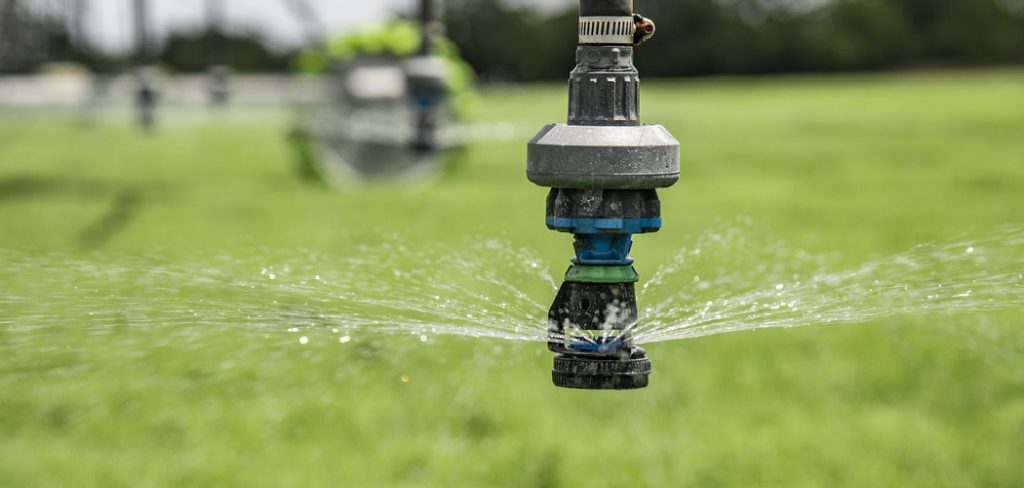
Especially when winter is around the corner, it is important to properly shut off your irrigation system so that it doesn’t freeze and damage your pipes and sprinkler heads. In this blog post, we will guide you through how to shut off irrigation system safely and effectively.
Can You Shut Off the Irrigation System?
Maintaining a lush green lawn is a point of pride for any homeowner, but what happens when the weather turns? Excessive rainfall can leave your yard looking more like a bog than a lawn, but what about during a prolonged dry spell? Turning off your irrigation system might seem counterintuitive, but it can help promote healthy grass growth.
Giving the roots time to dry out encourages them to dig deeper in search of nutrients, leading to stronger, more resilient plants. Shutting off your irrigation system can help conserve water during drought conditions, allowing you to do your part for the environment while maintaining a beautiful lawn.
Why Should You Shut Off the Irrigation System?
It may be tempting to leave your irrigation system on all year long, but there are several compelling reasons why you should shut it off. First, overwatering can harm your plants and even lead to diseases such as root rot. Second, it can drive up your water bill and waste precious resources.
By shutting off your irrigation system during the off-season and only using it when necessary, you’ll save money and resources and ensure the health and longevity of your plants. Plus, you can pat yourself on the back for making a small but important step towards being eco-friendly!
7 Steps to Follow on How to Shut Off Irrigation System
Step 1. Turn Off Your Main Water Supply Valve
You first need to locate the main valve that controls your water supply. This valve can be found where the water pipes enter your house or near your water meter. Turn the valve clockwise to shut off the water supply to your irrigation system. Make sure to do this very slowly. If the valve is older, it may break. Also, if the valve is tough to turn, try using a wrench.
Step 2. Remove Remaining Water from Your Irrigation System
After turning off your main water supply, you need to drain the remaining water from your irrigation system. This is important because even the smallest amount of water can freeze and damage your system during winter. To remove the remaining water, use the drain valve on the backflow preventer or the manual drain valve. Make sure to keep the valve open until all the water has been drained.
Step 3. Manually Run Your Irrigation System
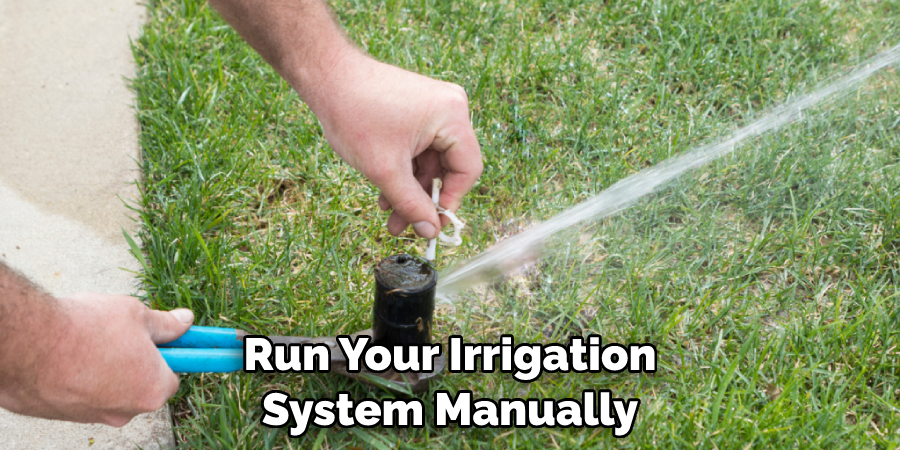
To run your irrigation system manually, turn on each zone for a few minutes. This will help drain out any additional water that might be left in the pipes. It is also an excellent way to check that your valves are working correctly. If you cannot manually run your irrigation system, it may indicate that there is a problem with your system that requires professional attention.
Step 4. Turn Off the Controller
Finally, you need to turn off the controller. The controller is the brain of the irrigation system and tells it when to turn on and off. Different models of controllers have different ways to turn them off. Sometimes it’s as simple as unplugging the unit. Others require you to navigate complex menus to turn off the system. If you’re unsure of how to turn off your controller, consult the user manual or call a professional.
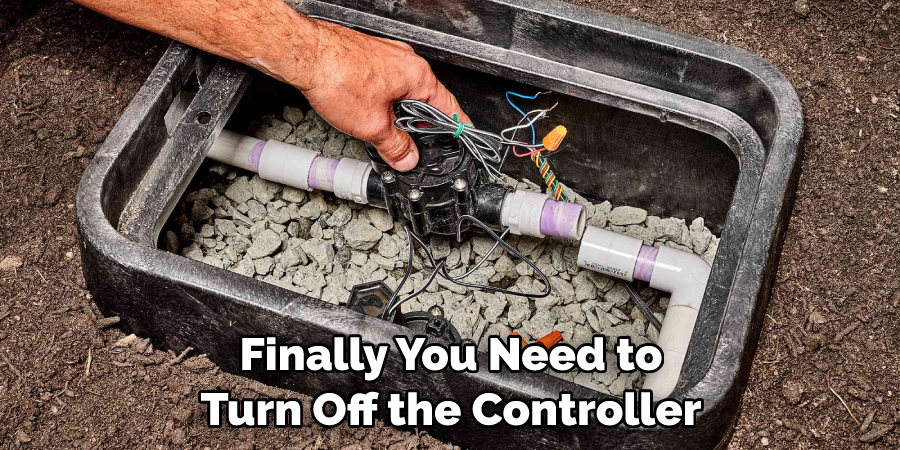
Step 5. Protect Your Backflow Preventer
The backflow preventer is an important part of your irrigation system and needs to be protected from winter frost. Depending on the model, you may need to remove it and store it in a warm place until spring. Alternatively, you can cover it with an insulated cover specifically designed for backflow preventers. If the cover has any ventilation holes, make sure to close them to prevent warm air from escaping.
Step 6. Protect Your Irrigation Valves
Irrigation valves can also be damaged by winter frost, so it’s important to protect them as well. Depending on the model, you may need to remove the valve from its housing and store it in a warm place until spring. Alternatively, you can cover the valve with an insulated cover specifically designed for irrigation valves.
Step 7. Check Your System in The Spring
Once winter has passed and you’re ready to use your irrigation again, make sure to carefully inspect your system and all its components before turning it on.
Check for any signs of damage or leaks that may have occurred during the winter months. If you find any damaged parts, replace them before turning on the system. It’s also a good idea to check with your local water authority to ensure that all of your irrigation components are up-to-date and compliant with local regulations.
That’s it! You’ve now learned the steps to shut off your irrigation system. Don’t forget to check it every spring before you turn it back on. With a little bit of maintenance and an understanding of how your system works, you can keep your irrigation running smoothly for years to come. Good luck!
5 Considerations Things When You Need to Shut Off Irrigation System
1. The Time of Year
One of the primary considerations when deciding whether or not to shut off your irrigation system is the time of year. If it is late in the season and the weather is cooling off, you may not need to water your plants as frequently. However, if it is early in the season or the weather is still warm, your plants will likely need to be watered more frequently.
2. The Type of Plants You Are Watering
Another consideration is the type of plants you are watering. Some plants, such as succulents, do not require as much water as other types of plants. As such, you may be able to get away with watering them less often. Conversely, if you are watering plants that require a lot of water, such as vegetables, you will likely need to water them more frequently.
3. The Amount of Rain We Have Received
Rainfall is also a consideration when deciding whether or not to shut off your irrigation system. If you have recently received a lot of rain, your plants will likely not need to be watered as often. However, if we have not received much rain, your plants will likely need to be watered more frequently.
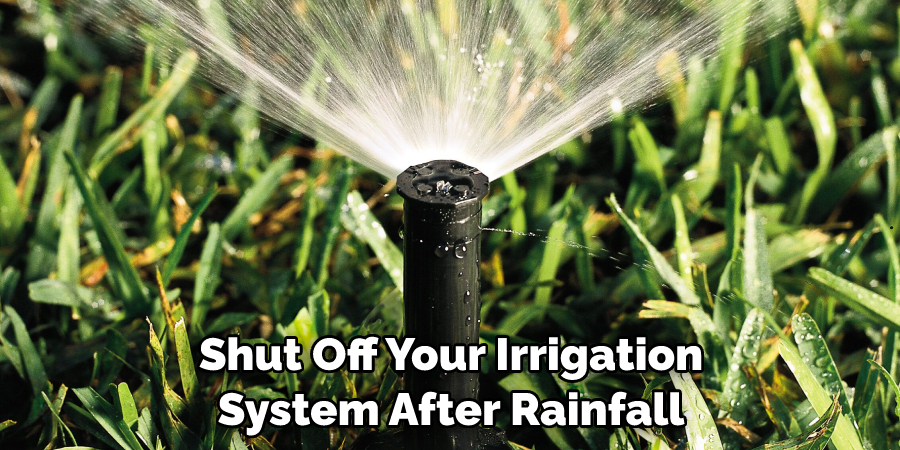
4. The Forecasted Weather
Another consideration is the forecasted weather. If the forecast calls for sunny and dry conditions, your plants will likely need to be watered more frequently. However, if the forecast calls for rainy and wet conditions, your plants will likely need to be watered less often.
5. Your Budget
Finally, another consideration is your budget. If you are on a tight budget, you may want to consider shutting off your irrigation system in order to save money on your water bill.
Benefits of Shut-Off Irrigation System
Water conservation is a crucial aspect of agriculture, and one-way farmers can reduce water waste is by implementing shut-off irrigation systems. These systems allow farmers to control water flow through their fields, ensuring water is directed precisely where it needs to go. Not only does this method help cut down on waste, but it can also improve crop yield.
By irrigating only when necessary, farmers can ensure their plants receive the optimal amount of water, leading to healthier and more abundant crops. Additionally, shut-off irrigation systems can save farmers time and money by reducing the need for manual labor. Overall, adopting shut-off irrigation systems can lead to a more sustainable and profitable agricultural operation.
Some Common Mistakes People Make When Trying to Shut Off Irrigation System
Shutting off your irrigation system may seem like a simple task, but some common mistakes people make could lead to big headaches down the line. For example, forgetting to turn off the water supply before shutting off the system can cause leaking and damage to the pipes.
Another mistake is not properly draining the system of any remaining water, which can cause frozen or burst pipes during the colder months. It’s important to take the time to properly shut off your irrigation system to ensure that it continues to function effectively and efficiently for years to come.
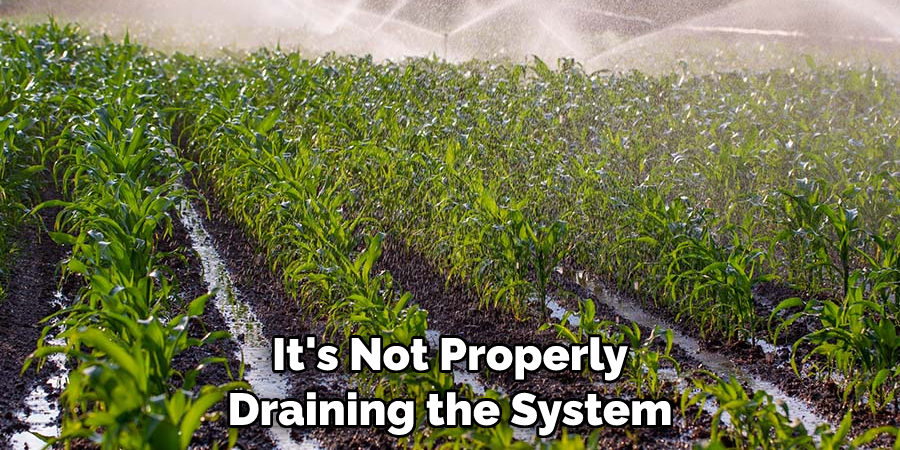
Is It Necessary to Turn Off the Water at The Meter Before Shutting Down an Irrigation System?
As the owner of an irrigation system, it is important to ensure proper maintenance to protect your system against damage and save on water bills. One of the crucial questions many owners ask is whether it is necessary to turn off the water at the meter before shutting down the irrigation system.
The answer is yes. Turning off the water at the meter is a critical step that ensures no water continues to flow through the system once you shut it down. This simple step can help protect your pipes from freezing in cold temperatures and prevent any potential leaks or water waste.
Bottom line: take an extra minute to turn off the water at the meter after shutting down your irrigation system, and you’ll save yourself a headache in the long run.
Conclusion
Now that you know how to shut off irrigation system, you can do so safely and easily. These simple steps can help protect your system from costly damage during the winter months.
Remember, it’s always better to be safe than sorry. Contact a professional if you’re unsure about any step of the process. They will be able to provide you with guidance and advice to ensure that your irrigation system is safely shut down for the winter.

